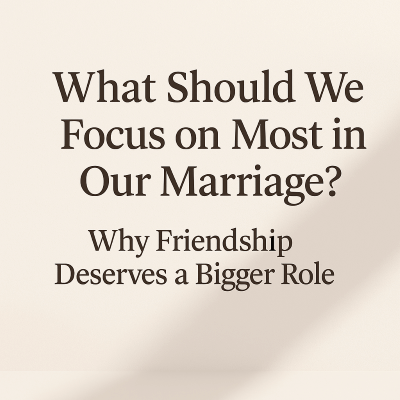 Many couples ask: “What should we be focusing on most if we want our marriage to thrive?” Some assume it’s all about conflict resolution—and while resolving disagreements is certainly important, research shows it’s not the only skill that predicts long-term success1. One often overlooked element? Friendship in marriage.
Many couples ask: “What should we be focusing on most if we want our marriage to thrive?” Some assume it’s all about conflict resolution—and while resolving disagreements is certainly important, research shows it’s not the only skill that predicts long-term success1. One often overlooked element? Friendship in marriage.
Relationship researcher Dr. John Gottman has found that couples who actively maintain a foundation of friendship—shared fondness, admiration, and mutual respect—tend to weather challenges more effectively2.
This doesn’t mean friendship replaces the need for good conflict management. Instead, it works alongside it, creating a positive emotional climate that makes difficult conversations easier and less damaging.
Why Friendship Matters in Marriage
According to Gottman’s research, described in The Seven Principles for Making Marriage Work, couples who regularly invest in their friendship tend to:
-
Build deeper intimacy—both emotional and physical—because they enjoy each other’s company and feel genuinely connected3.
-
Feel more loved and appreciated, increasing relationship satisfaction over time4.
-
Maintain a healthy “emotional bank account” by having more positive than negative interactions. In fact, Gottman’s “magic ratio” suggests that stable couples experience five positive interactions for every negative one5.
-
Recover from conflict more quickly because a strong friendship cushions the impact of disagreements6.
Friendship in marriage isn’t about being identical to your partner—it’s about consistently acting in ways that show care, curiosity, and respect.
Five Ways to Strengthen Friendship with Your Spouse
1. Set Aside Time for Real Conversations
Schedule regular check-ins where you talk about more than logistics. Explore your spouse’s past (childhood memories, formative experiences), present (daily highs and lows), and future (goals and dreams). This ongoing curiosity keeps you from assuming you “already know” them completely7.
2. Do Something Fun Together
Revisit shared hobbies or try something new—whether it’s a comedy club, a new sport, a puzzle, or volunteering. Research shows novelty can boost relationship satisfaction by creating fresh, shared memories8.
3. Speak Positively About Your Spouse to Others
Take moments to share what you admire about your partner in front of friends, family, or colleagues. Publicly acknowledging your appreciation strengthens both your bond and your partner’s sense of being valued9.
4. Turn Chores into Connection Opportunities
Everyday tasks can be small moments of intimacy if done together with intention. Skip the TV or phone, add music, and focus on the shared task—whether that’s cooking dinner, folding laundry, or cleaning out the garage10.
5. Show Up as a True Friend
This means being dependable, forgiving, supportive, and playful. Celebrate wins, comfort during losses, share laughter, and offer affection. Often, the behaviors that make us a good friend are the same ones that sustain a marriage11.
Key Takeaways
-
Friendship is a powerful foundation for marriage, complementing skills like conflict resolution.
-
Maintaining a positive emotional bank account helps couples recover from conflict faster.
-
Simple daily actions—curiosity, fun, public appreciation, shared chores, and reliability—can strengthen your bond.
-
Focusing on friendship can make hard conversations easier and the relationship more resilient over time.
Sources
- Markman, H. J., Stanley, S. M., & Blumberg, S. L. (2010). Fighting for Your Marriage. Jossey-Bass. ↩
- Gottman, J., & Silver, N. (2015). The Seven Principles for Making Marriage Work. Harmony Books. ↩
- Huston, T. L., & Houts, R. M. (1998). The psychological infrastructure of courtship and marriage: The role of personality and compatibility in romantic relationships. Journal of Personality, 66(1), 1–36. ↩
- Feeney, B. C., & Collins, N. L. (2003). Motivations for caregiving in adult intimate relationships: Influences on caregiving behavior and relationship functioning. Personality and Social Psychology Bulletin, 29(8), 950–968. ↩
- Gottman, J., & Levenson, R. W. (1992). Marital processes predictive of later dissolution. Journal of Personality and Social Psychology, 63(2), 221–233. ↩
- Driver, J., & Gottman, J. M. (2004). Daily marital interactions and positive affect during marital conflict among newlywed couples. Family Process, 43(3), 301–314. ↩
- Aron, A., et al. (2000). The experimental generation of interpersonal closeness: A procedure and some preliminary findings. Personality and Social Psychology Bulletin, 27(3), 363–377. ↩
- Reissman, C., Aron, A., & Bergen, M. R. (1993). Shared activities and marital satisfaction: Causal direction and self-expansion theory. Journal of Social and Personal Relationships, 10(2), 243–254. ↩
- Fincham, F. D., & Beach, S. R. (2010). Marriage in the new millennium: A decade in review. Journal of Marriage and Family, 72(3), 630–649. ↩
- Amato, P. R., & Previti, D. (2003). People’s reasons for divorcing: Gender, social class, the life course, and adjustment. Journal of Family Issues, 24(5), 602–626. ↩
- Karney, B. R., & Bradbury, T. N. (2005). Contextual influences on marriage: Implications for policy and intervention. Current Directions in Psychological Science, 14(4), 171–174. ↩






